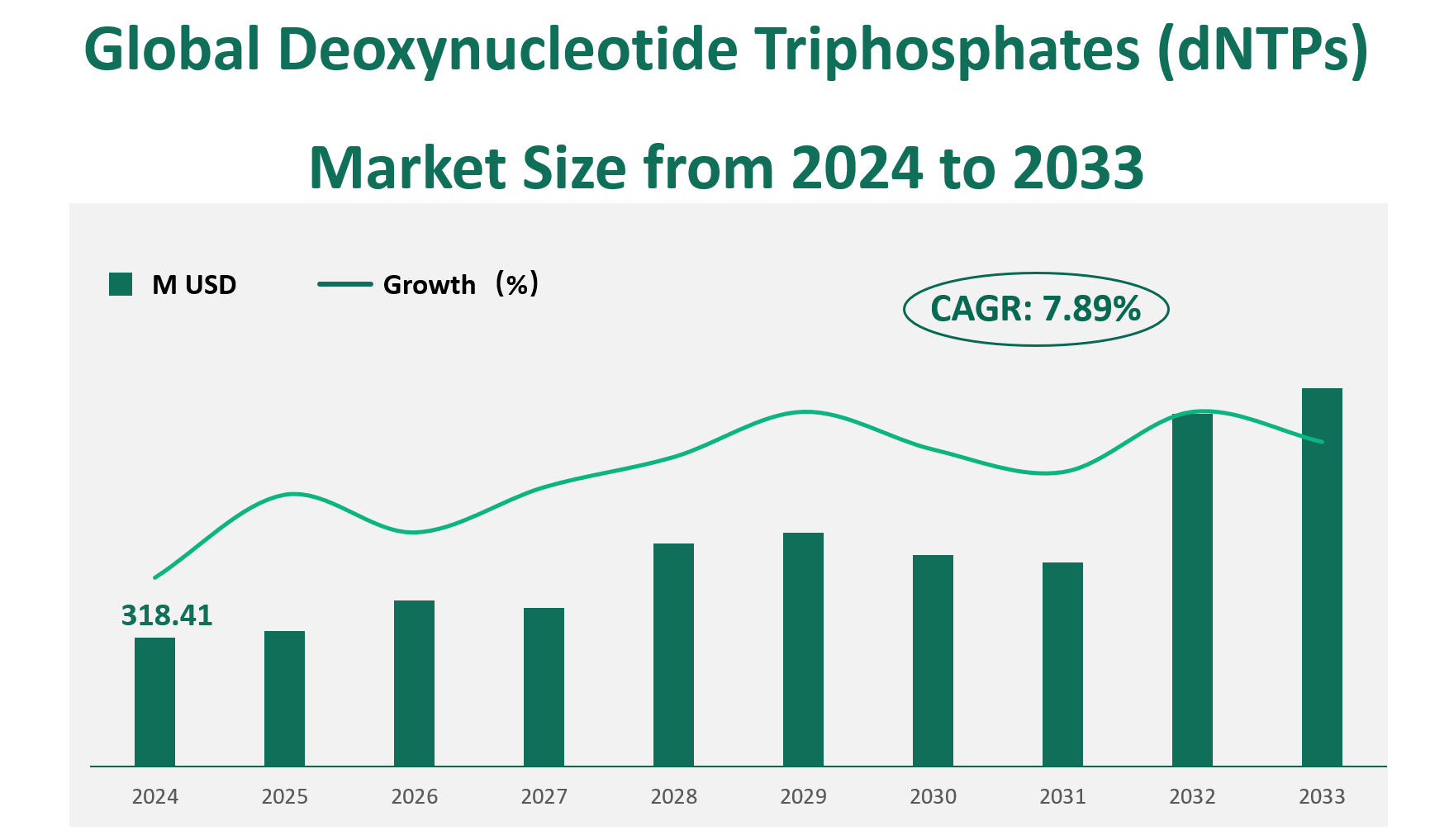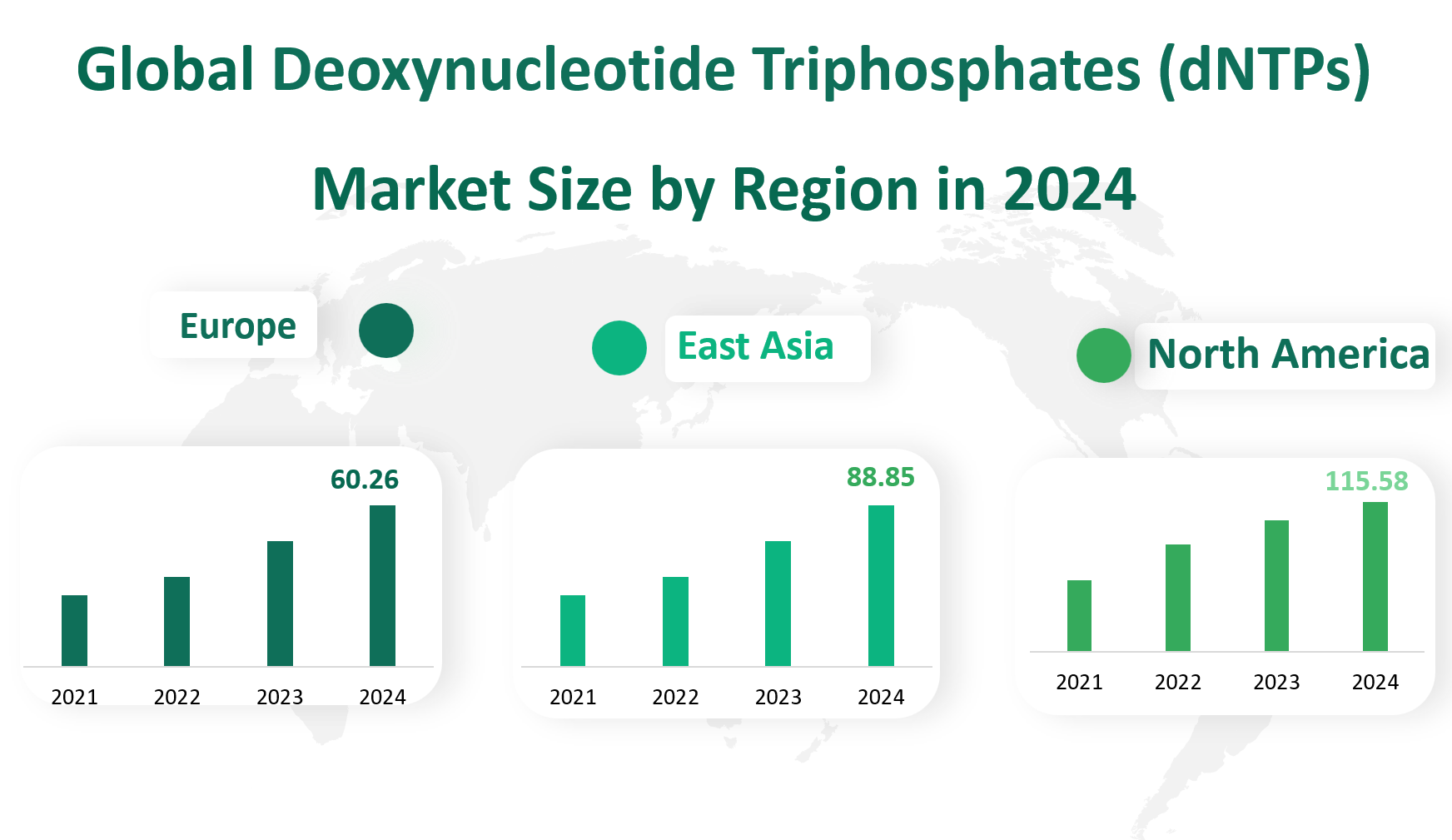1. Global Deoxynucleotide Triphosphates (dNTPs) Market Insight Analysis
The global Deoxynucleotide Triphosphates (dNTPs) market is projected to reach a value of 318.41 million USD in 2024, with a Compound Annual Growth Rate (CAGR) of 7.89% from 2024 to 2033.
Definition and Applications of Deoxynucleotide Triphosphates (dNTPs)
Deoxynucleotide triphosphates (dNTPs) are essential components in molecular biology, serving as the building blocks for DNA synthesis. These nucleotides are composed of a deoxyribose sugar, a phosphate group, and one of the four nitrogenous bases: adenine (A), thymine (T), cytosine (C), or guanine (G). dNTPs play a crucial role in various biological processes, including DNA replication, transcription, and repair. They are widely used in biotechnological applications such as Polymerase Chain Reaction (PCR), DNA sequencing, and genetic engineering.
The market for dNTPs is primarily driven by the growing demand from the pharmaceutical industry and research institutions. These sectors rely heavily on dNTPs for the development of new drugs, diagnostic tools, and genetic therapies. The increasing prevalence of genetic disorders and the need for personalized medicine have further fueled the demand for high-quality dNTPs. Additionally, advancements in next-generation sequencing technologies have created a significant demand for these nucleotides in research labs worldwide.
Figure Global Deoxynucleotide Triphosphates (dNTPs) Market Size (M USD) and CAGR (2024-2033)

2. Driving and Limiting Factors of Deoxynucleotide Triphosphates (dNTPs) Market Growth
Increasing Demand from Downstream Industries: The pharmaceutical and biotechnology sectors are the largest consumers of dNTPs. The development of new drugs, diagnostic tools, and genetic therapies requires high-quality nucleotides, driving the demand for dNTPs. Additionally, the increasing focus on personalized medicine and the need for accurate genetic testing have further boosted the market.
Advancements in Biotechnology: The rapid advancements in biotechnological techniques, such as next-generation sequencing (NGS) and PCR, have created a significant demand for dNTPs. These technologies rely on high-purity nucleotides to ensure accurate and reliable results, driving the market growth.
Rising Prevalence of Genetic Disorders: The increasing prevalence of genetic disorders and the need for accurate diagnosis and treatment have fueled the demand for dNTPs. Genetic testing and sequencing are becoming more common, driving the need for high-quality nucleotides.
Government Support and Funding: Governments around the world are increasingly supporting research and development in biotechnology and genomics. This support, in the form of grants and funding, has helped drive innovation and demand for dNTPs.
High Competition: The market is highly competitive, with several major players dominating the industry. Companies such as Thermo Scientific, Merck Millipore, and Meridian Bioscience hold significant market shares, making it difficult for new entrants to gain a foothold.
Regulatory Challenges: The biotechnology industry is highly regulated, and companies need to comply with strict quality standards and regulations. This can be a significant barrier for new entrants and can limit the growth of the market.
High Costs: The production of high-purity dNTPs is a complex and expensive process. The high costs associated with production and quality control can limit the market growth, especially for small and medium-sized enterprises.
Technological Limitations: While there have been significant advancements in biotechnology, there are still limitations in the production and application of dNTPs. These limitations can hinder the market growth and adoption of new technologies.
3. Technology Innovation and Corporate Mergers and Acquisitions in Deoxynucleotide Triphosphates (dNTPs) Market
The Deoxynucleotide Triphosphates (dNTPs) market is characterized by continuous technological innovation and strategic corporate activities. Major players in the industry are constantly investing in research and development to improve the quality and efficiency of their products. For example, Thermo Scientific and Merck Millipore have developed advanced dNTPs with higher purity and stability, making them suitable for a wide range of applications.
Corporate mergers and acquisitions have also played a significant role in shaping the market landscape. Companies are increasingly looking to expand their product portfolios through strategic acquisitions. For instance, the merger of Thermo Electron and Fisher Scientific to form Thermo Fisher Scientific has created a dominant player in the market. Similarly, Merck’s acquisition of Millipore Corporation has strengthened its position in the life sciences sector.
4. Global Deoxynucleotide Triphosphates (dNTPs) Market Size by Type
Deoxynucleotide Triphosphates (dNTPs) are nucleoside triphosphates containing deoxyribose. They are the fundamental units that make up DNA and are crucial for various molecular biology applications. The primary types of dNTPs include liquid and solid forms, each with distinct characteristics and uses.
Liquid dNTPs are aqueous solutions of the nucleotides, typically provided in concentrations suitable for immediate use in various molecular biology applications. They are highly stable and can be stored at room temperature, making them convenient for laboratory use. The forecasted market value for liquid dNTPs in 2024 is projected to be around 181.43 million USD.
Solid dNTPs are provided in dry form and require reconstitution before use. They are often preferred for long-term storage and are less susceptible to degradation compared to their liquid counterparts. The market value for solid dNTPs in 2024 is forecasted to be around 136.98 million USD.
Table Global Deoxynucleotide Triphosphates (dNTPs) Market Size by Type in 2024
5. Global Deoxynucleotide Triphosphates (dNTPs) Market Size by Application
Pharmaceutical sector utilizes dNTPs for drug development, genetic research, and the creation of diagnostic tools. The pharmaceutical industry is a significant consumer of dNTPs due to the increasing demand for personalized medicine and genetic therapies.
Academic and government research institutions use dNTPs for fundamental research in molecular biology, genetics, and genomics. These institutions are at the forefront of scientific discovery and require high-quality dNTPs for accurate and reliable results.
The pharmaceutical sector is projected to consume approximately 6,862,858 grams of dNTPs in 2024. This high consumption volume is driven by the increasing demand for genetic research and the development of new drugs. The pharmaceutical industry’s reliance on PCR and sequencing technologies for drug discovery and development contributes to its high consumption of dNTPs.
Research institutions are expected to consume around 1,884,093 grams of dNTPs in 2024. The consumption in this sector is driven by the ongoing research in molecular biology, genomics, and related fields. The need for high-quality dNTPs to support accurate and reliable research outcomes contributes to the steady consumption in this application.
Table Global Deoxynucleotide Triphosphates (dNTPs) Market Size by Application in 2024
|
Application |
Market Size (Grams) 2024 |
|
Pharmaceutical |
6862858 |
|
Research Institutions |
1884093 |
6. Global Deoxynucleotide Triphosphates (dNTPs) Market by Top Regions
North America has historically been a dominant market for dNTPs, driven by robust research and development activities in the United States and Canada. The region is projected to generate a revenue of approximately 115.58 million USD in 2024. The presence of major biotechnology and pharmaceutical companies, along with advanced research institutions, supports the high demand for dNTPs in this region.
East Asia, particularly China, Japan, and South Korea, is another significant market for dNTPs. The region is forecasted to generate a revenue of around 88.85 million USD in 2024. The growth is driven by the increasing focus on biotechnology research and the development of advanced diagnostic tools. China’s growing biotech sector and Japan’s strong pharmaceutical industry contribute significantly to the market value.
Europe is a mature market for dNTPs, with substantial contributions from countries like Germany, the UK, and France. The region is expected to generate a revenue of approximately 60.26 million USD in 2024. The presence of leading research institutions and the growing emphasis on personalized medicine drive the demand for dNTPs in Europe.
South Asia, led by India, is an emerging market for dNTPs. The region is projected to generate a revenue of around 15.62 million USD in 2024. The growth is driven by the increasing investment in healthcare and biotechnology research, particularly in India, which is rapidly becoming a hub for biotech innovation.
Southeast Asia, including countries like Indonesia, Thailand, and Singapore, is also an emerging market for dNTPs. The region is forecasted to generate a revenue of approximately 4.44 million USD in 2024. The growth is driven by the increasing focus on healthcare infrastructure and the development of diagnostic capabilities.
The Middle East, with countries like Saudi Arabia, Iran, and the UAE, is a growing market for dNTPs. The region is projected to generate a revenue of around 5.88 million USD in 2024. The growth is driven by the increasing investment in healthcare and the development of advanced diagnostic tools.
Africa is an emerging market for dNTPs, with significant potential for growth. The region is forecasted to generate a revenue of approximately 3.26 million USD in 2024. The growth is driven by the increasing focus on healthcare infrastructure and the development of diagnostic capabilities.
Oceania, primarily Australia and New Zealand, is a smaller but growing market for dNTPs. The region is projected to generate a revenue of around 5.59 million USD in 2024. The growth is driven by the increasing investment in biotechnology research and the development of advanced diagnostic tools.
South America, led by Brazil and Argentina, is an emerging market for dNTPs. The region is forecasted to generate a revenue of around 10.35 million USD in 2024. The growth is driven by the increasing investment in healthcare and the development of advanced diagnostic tools.
Figure Global Deoxynucleotide Triphosphates (dNTPs) Market Size by Region in 2024

7. Global Deoxynucleotide Triphosphates (dNTPs) Market Analysis by Major Players
7.1 Thermo Scientific
Introduction and Business Overview: Thermo Fisher Scientific is a leading global supplier of scientific instrumentation, reagents, and consumables. Established in 1956 and headquartered in Waltham, Massachusetts, Thermo Fisher offers a wide range of products and services to healthcare, life science, and industrial laboratories.
Products: Thermo Scientific offers high-quality dNTPs in liquid form, suitable for various molecular biology applications, including PCR, real-time PCR, and sequencing.
7.2 Merck Millipore
Introduction and Business Overview: Merck Millipore, part of the Merck Group, is a global life science company known for its high-quality reagents and consumables. Established in 1668 and headquartered in Darmstadt, Germany, Merck Millipore supplies a wide range of products to the life science industry.
Products: Merck Millipore offers a 10 mM dNTP mix, which is free of RNase and DNase and is suitable for applications such as PCR and cDNA synthesis.
7.3 Meridian Bioscience
Introduction and Business Overview: Meridian Bioscience is a fully integrated life science company that develops, manufactures, and markets diagnostic test kits and reagents. Established in 1977 and headquartered in Cincinnati, Ohio, Meridian Bioscience serves hospitals, research centers, and diagnostics manufacturers worldwide.
Products: Meridian Bioscience offers a set of sequencing-grade ultra-pure dNTPs in liquid form, suitable for various molecular biology applications.

